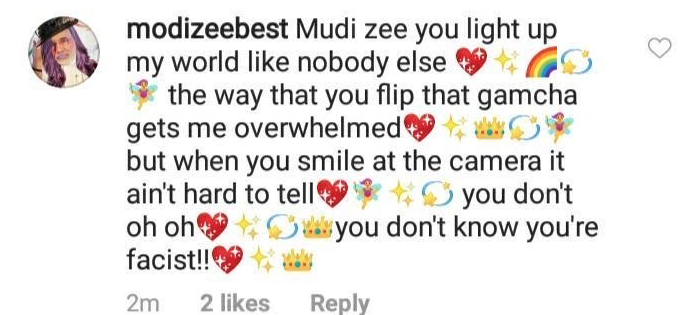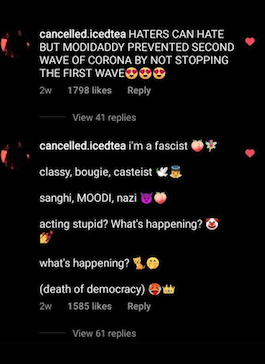For over two months, Gen Z and millennials have been dropping ‘fairy comments’ in the comments section of Prime Minister Narendra Modi’s Instagram posts with the purpose of registering their protest against recent government policy decisions.

For the uninitiated, mean fairy comments gained popularity on Chinese app TikTok, which was banned a month ago by the Central government in India, but have moved into other internet realms as well since. They use endearing emojis like 👑 , 🙈, 💞, ✨, 😍, 🦋, 🌱 before throwing in a bit of a twist.
𝐋𝐚𝐭𝐞𝐬𝐭 𝐭𝐫𝐞𝐧𝐝 𝐨𝐧 𝐓𝐢𝐤𝐓𝐨𝐤: 𝐦𝐞𝐚𝐧 𝐟𝐚𝐢𝐫𝐲 𝐜𝐨𝐦𝐦𝐞𝐧𝐭𝐬
What is a mean fairy comment?
Bittersweet comments that turn real sour in the 2nd halfExample below: https://t.co/npqB9KrnIv
— Tiffany Zhong (@TZhongg) May 6, 2020
“The entire phenomenon of how the Modi’s Instagram was overtaken by fairy comments purely organically and on its own speaks to a level of dissatisfaction that our generation, which is often unrepresented and not taken seriously, is feeling,” said Jude Lewis, an Anglo-Indian Christian teenager from Kerala.
“Whether it’s the general homophobic attitude of political leaders or the passing of the atrocious Transgender Persons (Protection of Rights) Act, 2019 in parliament, it’s clear that this government isn’t sensitive towards LGBTQIA+ issues,” he said.

Lewis is particularly upset because of the removal of reserved Anglo-Indian seats in parliament and state congregations “that was done without consulting the community” – an issue, he says, that hasn’t acquired the attention it deserves.
Underrepresented voices
When I spoke with a few millennials who have been part of the social media initiative, they essentially spoke of how “thousands of Modi’s followers leave compliments on his photographs on a daily basis”, which is why it made sense to join the chorus and drag attention to various issues.

As the initiative gained momentum, other underrepresented voices, such as those of the differently-abled, marginalised and lower-caste communities also joined in.
“It is important to speak and be heard, especially at a time like this when it is clear to see that the government has fascist tendencies,” said Alolika A. Dutta, a poet and activist from Mumbai who is a UN volunteer at the UNHRC, and works with the Young India Foundation.
Also read: Is India’s Gen-Z Asking the Right Questions?
Talking about some of the issues being raised, Dutta said:
“It is appalling that the government has effectively used the pandemic to intensify state repression and police brutality, push for commercial coal mining and railway privatisation, propose the EIA [Environmental Impact Assessment] draft and suppress climate activism through unfounded terror charges, suspend labour laws amid increasing unemployment, avoid addressing the need to revive consumer demand, hire independent auditors over allowing the CAG to audit the PM CARES fund, not disclose details of the Galwan valley dispute—the list goes on.”
“Since the current government has come to power, there has been an increase in hate speeches by BJP leaders like Kapil Mishra and Anurag Thakur. The manipulation of historical facts has also come to light, and the appropriation of certain figures,” said Jasraj Bhatia, a Gen Z residing in Madhya Pradesh.
“The government has played the religion card on the Indian public so well that even well-educated and woke citizens continue to endorse it,” he added.

“Spending Rs 2,989 crore on a statue says a lot about the mentality of this government, and the fact that bhakts have been defending such projects is ridiculous. Further, freedom of speech is limited up to the constitution – a prime example is of the protests against the controversial Citizenship Amendment Act (CAA) and the National Register of Citizens.”
Referring to the Act, one young Instagram user commented on Modi’s photo, saying: “Modi, pull me towards you like you did with non-Muslim refugees through CAA.”
There was also a bit of a misunderstanding that the reaction on Instagram was a direct result of the ban on TikTok. While the TikTok ban contributed in increasing the number of mean fairy comments on the prime minister IG posts, it wasn’t quite the root cause of the phenomenon.

Rape threats, death threats
However, taking strong stands on controversial issues comes with its own set of drawbacks. Most associated with this initiative has received death threats, obscene photographs and rape threats by supporters of the saffron party.
“The frequency of the death threats and rape threats has increased so much that at this point it’s like the threats are normalised and we are desensitised,” one such user said.
A considerable lot of these users were likewise accused of being “Chinese bots, Pakistani spies, and Chinese covert operatives”. As a result, many youngsters had to switch to commenting from spam accounts to avoid being doxxed. “It’s sad that we received rape threats. It made us angry, but we were hardly surprised,” said another user.
Also read: A Former Modi ‘Bhakt’ on Fascism in India Today
It is clear that there are many youngsters there who are discouraged with the kind of politics they have been witness to over the past few years.
More so, there has been a lot of disappointment when it comes to the media as most mainstream media channels and papers focus on government-gifted narratives instead of putting a light on issues that the public actually needs to debate – like the EIA, the Transgender Persons (Protection of Rights) Act, the conversion therapy, migrant workers, the government’s response to the pandemic, police brutality, labour rights, LGBTQIA+ rights, women’s rights, press freedom and so on.

While trawling the internet, it’s also impossible to miss the hateful comments that come flooding in for people who discuss such issues, with most being labelled ‘anti-nationals’ for simply voicing any concern.
“Being liberal is a bad thing now,” said one user.
India now seems set for a tug-of-war as the younger generations becomes more vocal using a new form of “internet speak”. What the government makes of this new trend is yet to be seen. But until then, be assured of a steady stream of this kind of dark humour that Gen Z loves best.
Peony Hirwani is a freelance journalist specialising in culture and lifestyle features with a history of writing for digital platforms like Vogue Arabia, Vogue Man Arabia, The Voice of London UK, Independent.co.uk, and GRAZIA India.
Featured image credit: Pariplab Chakraborty

